The Cammen Lab welcomes their newest member, Alayna Hawkins, who begins an MS in Marine Biology program this summer. A recent graduate of St. Francis College in Pennsylvania, with an interest in marine mammal science and genetics, Alayna joins the lab to conduct research on gray and harbor seal immunogenetics. She hopes to help elucidate why gray seals appear more resistant than harbor seals to several viral diseases through an exploration of the genetic diversity of their immune systems.
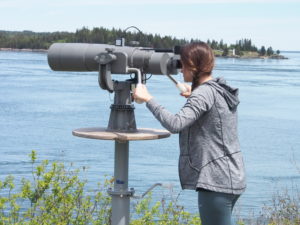
Liz Piotrowski scans for marine mammals in Western Passage using BigEyes.
This summer, undergraduate research assistants, Emma Newcomb and Liz Piotrowski, are leading a shore-based marine mammal visual monitoring program in Western Passage, a promising site for future tidal energy power. Once a week, they travel to Eastport, ME to conduct a 4-hour visual observation period, which later this summer will be supplemented by passive acoustic monitoring for marine mammal vocalizations (led by Chris Tremblay in Gayle Zydlewski’s lab). In their first month of observations, Emma and Liz have observed harbor porpoise, harbor seal, and minke whale.
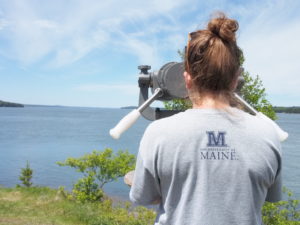
Emma Newcomb looks out over Western Passage in search of marine mammals.
This research is conducted in collaboration with Ocean Renewal Power Company. Emma’s summer internship, which also includes a historical analysis of marine mammal stranding rates in Maine, is funded by the SEA Fellows program.
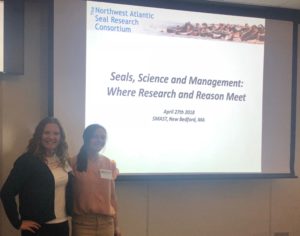
Sarah Vincze and Sarah Burton represented the Cammen Lab at the 2018 Northwest Atlantic Seal Research Consortium (NASRC) Meeting. Sarah Vincze was invited to give an oral presentation on our recently published paper, Genetic Diversity from Pre-bottleneck to Recovery in Sympatric Pinnipeds in the Northwest Atlantic.
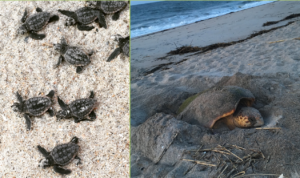
Congratulations to Faythe Goins, who publicly defended her undergraduate Honors thesis research this afternoon in front of friends, family, academic colleagues, and the entire UMaine women’s softball team! Faythe studied how environmental factors, such as temperature, cloud cover, and precipitation, have affected loggerhead sea turtle nesting on Edisto Island, SC over the past 8 years. In addition to her research, Faythe presented a reading list of books, texts, and musical pieces that have been important to her throughout her college career. For her excellent thesis and presentation, Faythe earned Highest Honors!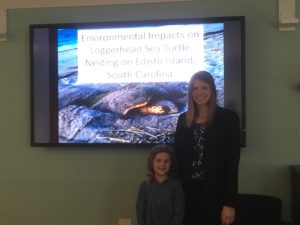 Faythe’s analysis relied on long-term data collected by volunteers for the SC Department of Natural Resources, a program which Faythe herself has participated over the past 4 summers. Faythe is excited to spend one more summer on sea turtle patrol in SC before heading to the University of Georgia Veterinary School this fall.
Faythe’s analysis relied on long-term data collected by volunteers for the SC Department of Natural Resources, a program which Faythe herself has participated over the past 4 summers. Faythe is excited to spend one more summer on sea turtle patrol in SC before heading to the University of Georgia Veterinary School this fall.
This week three undergraduate students in the Cammen lab presented their research at UMaine student research symposia. Please join us in congratulating the students for their excellent poster presentations!
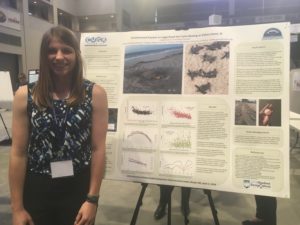 Faythe Goins presented her honors thesis research, Environmental Impacts on Loggerhead Sea Turtle Nesting on Edisto Island, SC, at the 2018 UMaine Student Symposium and won best poster presentation in Natural Sciences! She also presented her research at the School of Marine Sciences Capstone Symposium, and will publicly defend her thesis next week.
Faythe Goins presented her honors thesis research, Environmental Impacts on Loggerhead Sea Turtle Nesting on Edisto Island, SC, at the 2018 UMaine Student Symposium and won best poster presentation in Natural Sciences! She also presented her research at the School of Marine Sciences Capstone Symposium, and will publicly defend her thesis next week.
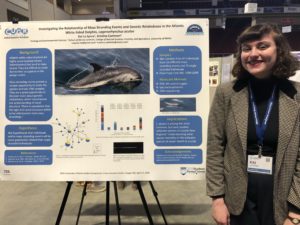 Kai LaSpina presented preliminary results from her Capstone research, Investigating the relationship of mass stranding events and genetic relatedness in the Atlantic white-sided dolphin, Lagenorhynchus acutus, at the 2018 UMaine Student Symposium. Stay tuned for future results and presentations of Kai’s research!
Kai LaSpina presented preliminary results from her Capstone research, Investigating the relationship of mass stranding events and genetic relatedness in the Atlantic white-sided dolphin, Lagenorhynchus acutus, at the 2018 UMaine Student Symposium. Stay tuned for future results and presentations of Kai’s research!
Sarah Vincze presented her senior Capstone research, An analysis of bottlenose dolphin (Tursiops truncatus) unusual mortality events along Florida’s Gulf of Mexico coastline in association with Karenia brevis blooms, at the School of Marine Sciences Capstone symposium.
With the start of a new year and a new semester, it’s time to welcome new and returning members of the Cammen Lab. This semester, Emma Newcomb, Sarah Burton, and Holland Haverkamp have returned to the lab to continue their research on marine mammal stranding rates in Maine. Kai LaSpina is continuing her research on genetic relatedness of mass stranded Atlantic white-sided dolphins. Sarah Vincze continues her Capstone literature review on the effects of HABs on bottlenose dolphins and is back in the lab, after a semester at the Darling Marine Center, to collaborate on various marine mammal genetics projects. Faythe Goins is preparing to defend her Honors thesis on loggerhead sea turtle nesting trends in South Carolina later this spring. This semester, we also welcome two new members: Emma Spies, a freshman UMaine Top Scholar, who will be initiating a project on immunogenetic diversity in gray and harbor seals, and Liz Piotrowski, who is starting her Capstone research on Atlantic white-sided dolphin sightings in the Gulf of Maine. It’s exciting to have a great group of students involved in our research and we all look forward to a productive semester! You can learn more about these students and opportunities to join the Cammen Lab here.
As a final project, this year’s INT308 (Marine Mammal Ecology and Conservation) undergraduate students produced the inaugural Marine Mammals in the News online publication. From whales to manatees, from the Arctic to Mexico, from conservation to physiology, and much more – check out the stories they wrote, highlighting marine mammal science that has been published within the last year.
Congratulations to Amanda Shuman, who successfully defended her Honors thesis entitled The Potential Impact of Climate Change on Blue Whale Migration in the Eastern Pacific. Amanda, who was co-advised by Drs. Kristina Cammen and Fei Chai, focused on three main topics for her literature review-based thesis: current blue whale migration patterns, current conditions of blue whale calving and foraging grounds, and climate change projections for those key areas. Through her synthesis of the current literature on these topics, she concludes that the foraging grounds (in particular local krill abundance) are likely to be more dramatically impacted by climate change than the calving grounds, and accordingly blue whales will likely have to extend their current migration route to find sufficient prey in the warming subpolar waters.
This fall, Amanda will begin a Masters program in Environmental Science at the University of New Haven. We wish her luck in her next steps!

